Final Fantasy is a fantasy anthology media franchise created by Hironobu Sakaguchi which is owned, developed, and published by Square Enix. The franchise centers on a series of fantasy role-playing video games. The first game in the series was released in 1987, with 16 numbered main entries having been released to date.
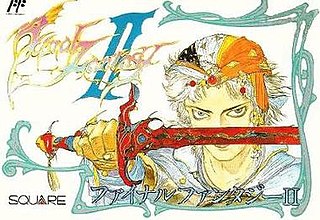
Final Fantasy II is a 1988 role-playing video game developed and published by Square for the Family Computer as the second installment of the Final Fantasy series. The game has received numerous enhanced remakes for the WonderSwan Color, the PlayStation, the Game Boy Advance, the PlayStation Portable, iOS, Android and Windows. As neither this game nor Final Fantasy III were initially released outside Japan, Final Fantasy IV was originally released in North America as Final Fantasy II, so as not to confuse players. Following enhanced versions for iOS and Android in 2010 and 2012 respectively, the game was re-released again as part of the 2021 Final Fantasy Pixel Remaster series.

Final Fantasy IV, titled Final Fantasy II in its initial North American release, is a 1991 role-playing video game developed and published by Square for the Super Nintendo Entertainment System. The fourth main installment of the Final Fantasy series, the game's story follows Cecil, a dark knight, as he tries to prevent the sorcerer Golbez from seizing powerful crystals and destroying the world. He is joined on this quest by a frequently changing group of allies. Final Fantasy IV introduced innovations that became staples of the Final Fantasy series and role-playing games in general. Its "Active Time Battle" system was used in five subsequent Final Fantasy games, and unlike prior games in the series, IV gave each character their own unchangeable character class — although at a few points in the story, a dark knight will choose the path of a paladin, or a summoner will evolve to a new tier of spellcasting.
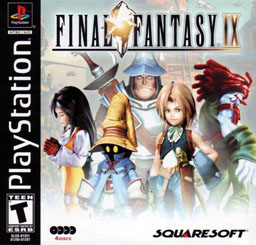
Final Fantasy IX is a 2000 role-playing video game developed and published by Square for the PlayStation video game console. It is the ninth game in the main Final Fantasy series. The plot focuses on a war between nations in a medieval fantasy world called Gaia. Players follow a thief named Zidane Tribal who kidnaps princess Garnet Til Alexandros XVII as part of a ploy by the neighboring nation of Lindblum. He joins Garnet and a growing cast of characters on a quest to take down her mother, Queen Brahne of Alexandria, who started the war.

Final Fantasy III is a role-playing video game developed and published by Square for the Family Computer. The third installment in the Final Fantasy series, it is the first numbered Final Fantasy game to feature the job-change system. The story revolves around four orphaned youths drawn to a crystal of light. The crystal grants them some of its power, and instructs them to go forth and restore balance to the world. Not knowing what to make of the crystal's pronouncements, but nonetheless recognizing the importance of its words, the four inform their adoptive families of their mission and set out to explore and bring back balance to the world.

Chocobo Racing is a racing game developed and published by Square for the PlayStation, A spin-off of the Final Fantasy series and part of the Chocobo spin-off series. It was released in Japan in March 1999, followed by North America and Europe in August and October, respectively. The game's star and namesake is the Chocobo, with other figures from the Final Fantasy series, such as Mog the Moogle, the Black Mage, and Cid being part of the cast. Most of the game's soundtrack is composed using songs from previous Final Fantasy titles. As a formulaic kart racer, Chocobo Racing is often compared to Mario Kart and Crash Team Racing.

The Chocobo is a fictional species created for the Final Fantasy franchise by Square Enix. A galliform bird commonly having yellow feathers, they were first introduced in Final Fantasy II (1988), and have since featured in some capacity in nearly every Final Fantasy title, usually as a means of transport. Chocobos or chocobo-themed characters have played story roles in multiple titles, notably in Final Fantasy V and XIII. A recurring Chocobo also acts as protagonist of the Chocobo spin-off series.

Final Fantasy Crystal Chronicles is an action role-playing video game developed by The Game Designers Studio and published by Nintendo for the GameCube. It was released in 2003 in Japan and 2004 in North America, Europe and Australia. A remastered version for Nintendo Switch, PlayStation 4, Android, and iOS was released in August 2020. A spin-off of the Final Fantasy series and beginning of the series of the same name, Crystal Chronicles was the first title in the franchise to be released for a Nintendo home console since Final Fantasy VI in 1994.
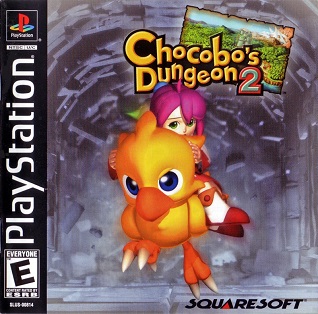
Chocobo's Dungeon 2 is the 1998 role-playing video game by Square for the PlayStation. It is the sequel to 1997's Chocobo's Mysterious Dungeon.

Final Fantasy Crystal Chronicles: The Crystal Bearers is an action-adventure game developed by Square Enix and released for Wii. It was released on November 12, 2009 in Japan and on December 26 in North America. The game received a mixed reception.
Mystery Dungeon, known in Japan as Fushigi no Dungeon, is a series of roguelike role-playing video games. Most were developed by Chunsoft, now Spike Chunsoft since the merging in 2012, and select games were developed by other companies with Chunsoft's permission. The series began when co–creator of Dragon Quest, Koichi Nakamura, was inspired by Seiichiro Nagahata's experience with Rogue, who is also a fellow developer from the company, and a desire to create an original series. It began on the Super Famicom, progressing to almost all of Nintendo's and Sony's home and handheld consoles, WonderSwan, Dreamcast, Windows, and mobile devices.
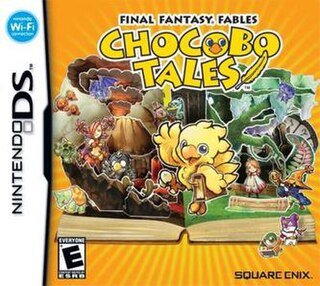
Final Fantasy Fables: Chocobo Tales, released in Japan as Chocobo to Mahō no Ehon is a Nintendo DS adventure game developed by h.a.n.d. and published by Square Enix. It was released in Japan on December 14, 2006, in North America on April 3, 2007, and in the PAL region in May.

Final Fantasy Fables: Chocobo's Dungeon is a 2007 role-playing video game published by Square Enix for the Wii. It is an installment in the Chocobo series that focuses on Chocobo and his quest to free a town lost in time from eternal forgetfulness. It is a loose sequel to Chocobo's Dungeon 2 on the PlayStation.
The Chocobo video game series is a spin-off series composed of over a dozen games developed by Square Co. and later by Square Enix featuring a super deformed version of the Chocobo, a Final Fantasy series mascot and fictional bird, as the protagonist. Several of the titles have received separate album releases of music from the game. The music of the Chocobo series includes soundtrack albums for the Chocobo's Mysterious Dungeon sub-series—comprising Chocobo's Mysterious Dungeon, Chocobo's Dungeon 2, and Final Fantasy Fables: Chocobo's Dungeon—and soundtrack albums of music from Chocobo Racing, Final Fantasy Fables: Chocobo Tales, and Chocobo and the Magic Picture Book: The Witch, The Maiden, and the Five Heroes, as well as an album of arranged music from Chocobo's Mysterious Dungeon and a single entitled Chocobo no Fushigina Dungeon Toki Wasure No Meikyuu: Door Crawl for the theme song of Final Fantasy Fables: Chocobo's Dungeon.
Final Fantasy Crystal Chronicles is a series of video games within the Final Fantasy franchise developed by Square Enix. Beginning in 2003 with the game for the GameCube, the series has predominantly been released on Nintendo gaming hardware and covers multiple genres, including action role-playing. The Crystal Chronicles series takes place in an unnamed world inhabited by four tribes. Recurring themes include creating objects from memory and the importance of family. The gameplay, which has always been aimed at as wide an audience as possible within a genre, generally involves either multiple players or a large group working together.
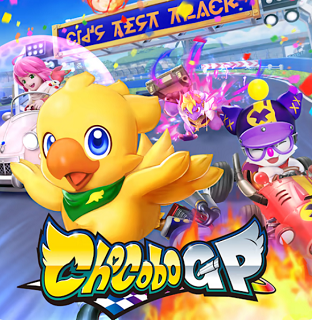
Chocobo GP is a 2022 kart racing game developed by Arika and published by Square Enix for the Nintendo Switch. The game is a spin-off of the Final Fantasy series and is a sequel to 1999's Chocobo Racing. It was released in celebration of the series' 35th anniversary and features locales and characters from across the franchise.













